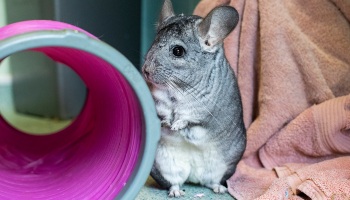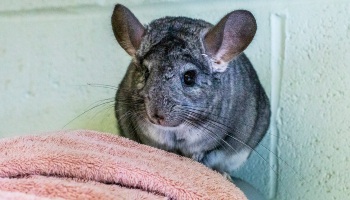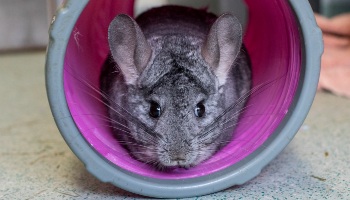- Find a Pet
- Advice and Welfare
- Ways to Give
- Get Involved
- What We Do
- Search
- My RSPCA
- Report a concern
- Sponsor
-
Colour modeVivid Calm
- Home
- Advice and welfare
- Pets
- Rodents
- Chinchillas
- Company
Keeping chinchillas together
Chinchillas are naturally sociable animals and live in groups in the wild. That's why you'll need to keep your pet chinchilla with at least one other friendly chinchilla unless advised otherwise by a vet or clinical animal behaviourist.
Here's what you need to know about keeping chinchillas together.

Keeping boy and girl chinchillas together
Chinchillas can be kept as male/female pairs or in single-sex groups. However, you shouldn't keep chinchillas with the opposite sex unless you intend to breed from them and have plans in place for caring for both parents and babies.
Alternatively, you can keep them together if one or both animals have been neutered. Male chinchillas can be neutered, but it isn't common to neuter females.
Introducing chinchillas to each other
Chinchillas can be aggressive, especially when they're first introduced or during breeding. Introduce new chinchillas to the group gradually and keep a close eye on them. Always house new chinchillas near each other for at least a week before introducing them properly.
Make sure each chinchilla has what they need
When you're keeping more than one chinchilla together, you'll need to make sure each chinchilla has enough of what they need, such as food, water, nest boxes and hiding places.
Chinchillas can be bullied and may suffer if they can't escape from others. Hiding places are important to ensure they can escape from their companions or hide if they feel scared. Make sure there are enough nest boxes and hiding places for at least one each and give them at least one box large enough for them all to rest together.
If you keep your chinchilla alone
If you keep your chinchilla alone, you'll need to give them companionship by interacting with them every day. Chinchillas who've been well handled by people from a young age can see humans as friends and companions, so get them used to this by handling them every day from an early age.
Chinchillas will come for petting, but even friendly ones tend to resist being held and will struggle. You can interact with them by letting them approach you for petting or a small food treat. If you do have to pick them up, do so gently but firmly to avoid damaging them or their fur if they struggle.
If your chinchillas received little handling when they were young, or have had rough handling anytime, they may find human contact distressing. This can show as fearfulness, trying to escape, fur loss or aggression.
Keeping your chinchillas happy around other pets
Chinchillas need constant supervision when they're with another animal or person that may harm or frighten them (whether deliberately or accidentally). Never let chinchillas out of their housing with a dog, cat, ferret or large bird present, as chinchillas see them as predators or threats and get stressed around them.
Remember, chinchillas can develop abnormal behaviour and may suffer if they're left on their own or with nothing to do for long periods. Ask for advice from a clinical animal behaviourist if you're unsure or have problems.



